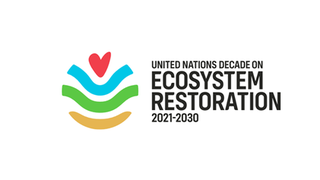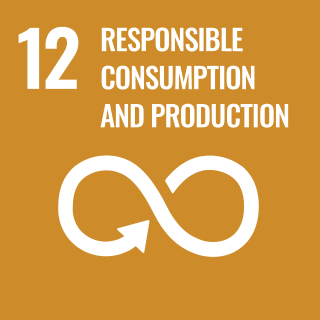
The United Nations Economic and Social Council (ECOSOC) is one of the six principal organs of the United Nations, responsible for coordinating the economic and social fields of the organization, specifically in regards to the fifteen specialized agencies, the eight functional commissions, and the five regional commissions under its jurisdiction.
The United Nations Commission on Sustainable Development (CSD) was a body under the UN Economic and Social Council (ECOSOC) tasked with overseeing the outcomes of the 1992 United Nations Conference on Environment and Development/Earth Summit. It was replaced in 2013 by the High-level Political Forum on Sustainable Development, which meets both under the General Assembly every four years and the ECOSOC in other years.
The United Nations Volunteers (UNV) programme is a United Nations organization that contributes to peace and development through volunteerism worldwide.

The United Nations Office for Disaster Risk Reduction (UNDRR) was created in December 1999 to ensure the implementation of the International Strategy for Disaster Reduction.

The 2030 Agenda for Sustainable Development, adopted by all United Nations members in 2015, created 17 world Sustainable Development Goals (SDGs). They were created with the aim of "peace and prosperity for people and the planet..." – while tackling climate change and working to preserve oceans and forests. The SDGs highlight the strong interconnections between the environmental, social and economic aspects of sustainable development. Sustainability is at the center of the SDGs.

Established in 1992, the Major Group for Children and Youth is the United Nations General Assembly mandated, official, formal and self-organised space for children and youth to contribute to and engage in certain intergovernmental and allied policy processes at the United Nations.
The Addis Ababa Action Agenda was the outcome of the 2015 Third International Conference on Financing for Development, held in Addis Ababa, Ethiopia. It was adopted by heads of state and government on 15 July 2015. 174 United Nations member states sent delegations; 28 heads of State, vice presidents and heads of government attended. Governments were joined by the heads of the United Nations, the International Monetary Fund (IMF), the World Bank and the World Trade Organization (WTO), prominent business and civil society leaders, and other stakeholders. The agreement is a follow-up to the 2002 Monterrey Consensus and the 2008 Doha Declaration on Financing for Development.

The United Nations Decade on Ecosystem Restoration runs from 2021 to 2030. Similar to other nature related international decades, its purpose is to promote the United Nation's environmental goals. Specifically, to facilitate global cooperation for the restoration of degraded and destroyed ecosystems. Along with fostering efforts to combat climate change, safeguard biodiversity, food security, and water supply. While much focus is on promoting restoration activity by national governments, the UN also wishes to promote such efforts from other actors, ranging from the private sector and NGOs to regular individuals.

Endorsed in December 2017, the United Nations Decade of Family Farming 2019-2028 seeks to place family farming at the center of national public policies and investments. In declaring this decade, the United Nations General Assembly recognized the importance of family farming in reducing poverty and improving global food security. The UN Decade of Family Farming is led by the Food and Agriculture Organization (FAO) and the International Fund for Agricultural Development (IFAD) in collaboration with governments and civil society organizations.

Sustainable Development Goal 15 is about "Life on land". One of the 17 Sustainable Development Goals established by the United Nations in 2015, the official wording is: "Protect, restore and promote sustainable use of terrestrial ecosystems, sustainably manage forests, combat desertification, and halt and reverse land degradation and halt biodiversity loss". The Goal has 12 targets to be achieved by 2030. Progress towards targets will be measured by 14 indicators.

Sustainable Development Goal 12, titled "responsible consumption and production", is one of the 17 Sustainable Development Goals established by the United Nations in 2015. The official wording of SDG 12 is "Ensure sustainable consumption and production patterns". SDG 12 is meant to ensure good use of resources, improve energy efficiency and sustainable infrastructure, provide access to basic services, create green and decent jobs, and ensure a better quality of life for all. SDG 12 has 11 targets to be achieved by at least 2030, and progress towards the targets is measured using 13 indicators.

Sustainable Development Goal 11, titled "sustainable cities and communities", is one of 17 Sustainable Development Goals established by the United Nations General Assembly in 2015. The official mission of SDG 11 is to "Make cities inclusive, safe, resilient and sustainable". The 17 SDGs take into account that action in one area will affect outcomes in other areas as well, and that development must balance social, economic and environmental sustainability.

Sustainable Development Goal 9 is about "industry, innovation and infrastructure" and is one of the 17 Sustainable Development Goals adopted by the United Nations General Assembly in 2015. SDG 9 aims to build resilient infrastructure, promote sustainable industrialization and foster innovation.

Sustainable Development Goal 2 aims to achieve "zero hunger". It is one of the 17 Sustainable Development Goals established by the United Nations in 2015. The official wording is: "End hunger, achieve food security and improved nutrition and promote sustainable agriculture". SDG 2 highlights the "complex inter-linkages between food security, nutrition, rural transformation and sustainable agriculture". According to the United Nations, there are around 690 million people who are hungry, which accounts for slightly less than 10 percent of the world population. One in every nine people goes to bed hungry each night, including 20 million people currently at risk of famine in South Sudan, Somalia, Yemen and Nigeria.

Global Goals Week is a shared commitment between a coalition of over 160 partners across all industries, which mobilizes annually in September to bring together communities, demand urgency, and supercharge solutions for the Sustainable Development Goals (SDGs). It was founded in 2016 by the United Nations Foundation, Project Everyone, and the United Nations Development Programme (UNDP). It is timed to coincide with the UN General Assembly "High-Level Week" in New York. The week includes events, summits, conferences, forums, workshops, pledges, and other activations in New York, around the world, and online. It usually runs alongside Climate Week NYC, the annual conference of Goalkeepers, Bloomberg Global Business Forum and many other high-level events.

The "Sustainable Development Goals and Australia" describe how Australia participates in the Sustainable Development Goals (SDGs) process. The SDGs are a collection of 17 global goals designed to be a "blueprint to achieve a better and more sustainable future for all". The SDGs, set in 2015 by the United Nations General Assembly and intended to be achieved by the year 2030, are part of a UN Resolution called "The 2030 Agenda". The targets and indicators for the SDGs are included in the UN Resolution adopted by the General Assembly two years later on 6 July 2017.

Sustainable Development Goals and Nigeria is about how Nigeria is implementing the Sustainable Development Goals within the thirty-six states and its Federal Capital Territory (FCT). The Sustainable Development Goals (SDGs) consist of seventeen global goals designed as a "blueprint to achieve a better and more sustainable future for all". Each of the 17 goals is expected to be achieved by 2030 in every country around the world.
Sustainable Development Goals and Lebanon explains major contributions launched in Lebanon towards the advancement of the Sustainable Development Goals SDGs and the 2030 agenda.
The Education and Academia Stakeholder Group (EASG) is an official United Nations stakeholder group composed of organisations dedicated to promoting the right inclusive and equitable quality education and lifelong learning opportunities for all. It was formed in 2016 and includes human rights-based civil society organisations and academic institutions. As a recognised stakeholder group, the EASG monitors and reviews the Sustainable Development Goals (SDGs). During the annual High-level Political Forum, EASG provides interventions and submits shadow reports shading light on developments countries downplay in their own reporting.













